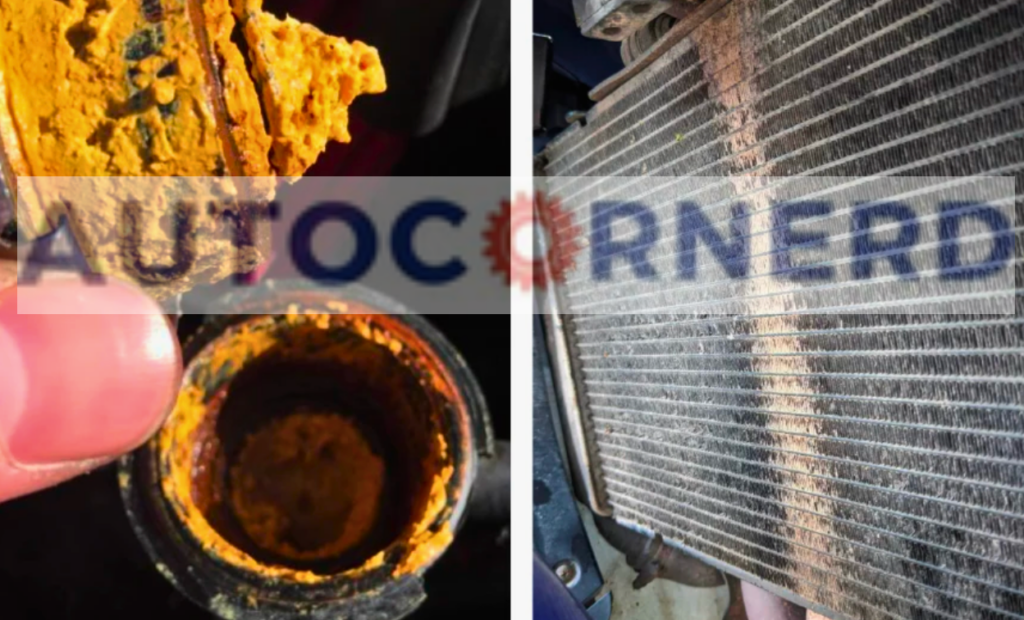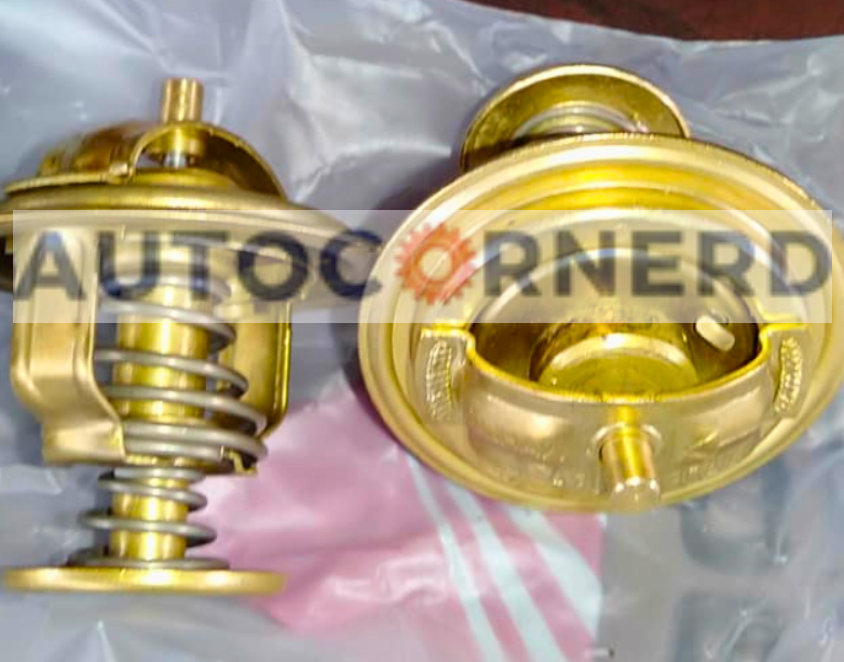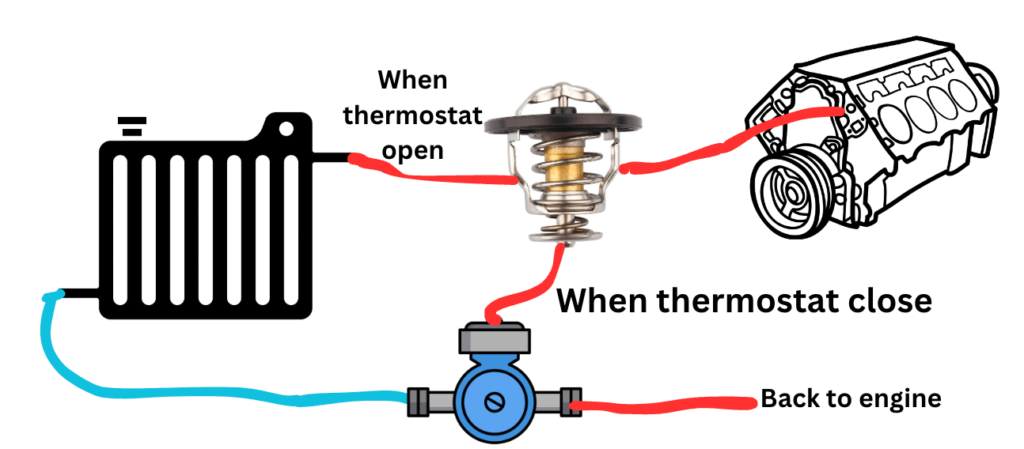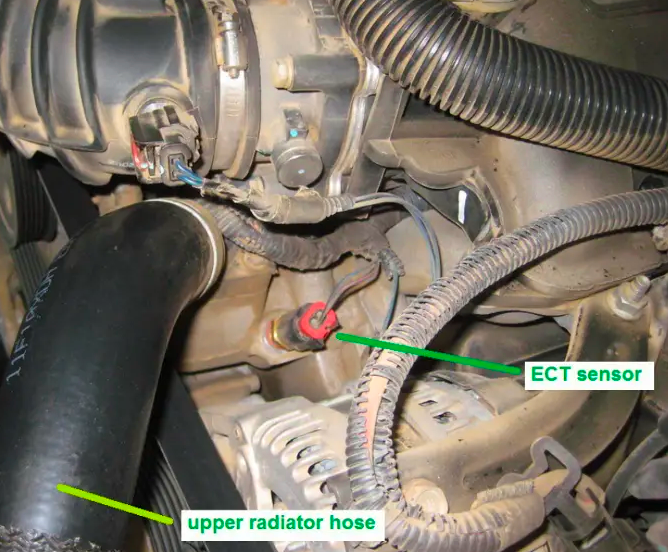AC Off Due To High Engine Temperature: 6 Causes
It’s a hot summer day. You are driving with the air conditioner blasting cool air. Then suddenly it shuts off! Before you start sweating a lot, don’t panic. This annoying problem of the AC turning off due to a too hot engine temperature happens a lot.
In this guide, I will walk you through why it happens and how to stop your AC from shutting off when you need it most. I’ve got some easy tips to help you stay cool while avoiding an engine that is too hot.
You can also read my guide on Car AC Not Blowing Cold Air When Idle.
For your convenience, I’ve designed an interactive tool that diagnoses car troubles. It walks you through straightforward steps. Make sure to use it.
- AC turns off due to high engine temp as a safety feature to prevent damage. Overheating can be caused by cooling system issues like faulty thermostat or low coolant.
- Check temp gauge first to confirm overheating. Then inspect cooling system parts like radiator, water pump, thermostat to find the root cause.
- Flush radiator and replace coolant if radiator is clogged. Check radiator fan operation if it’s faulty.
- Top up coolant if level is low. Leaks may need to be repaired. Replace thermostat if stuck closed.
- Faulty temp sensor can give false overheat signal, making AC turn off unnecessarily. Test and replace if needed.
Why Does Engine Overheating Cause AC Shutdown?
There is a safety feature in the car’s computer (ECU) that turns the AC off when the engine gets too hot. This protects the overheated engine from getting damaged even more.
The engine can overheat if there are cooling system problems. A faulty thermostat or a clogged radiator stops heat from going away. Low coolant levels also cause overheating.
The AC parts can get clogged too. Like the compressor and condenser. When they get clogged, cold air can’t flow well. This makes the AC overheat.
To fix the AC turning off from high engine heat, it’s important to check the engine cooling system and AC parts. Make sure they are working right.
What is My Personal Experience With AC Shut Off Because of High Engine Temp?
Once my uncle called about his 2005 Honda Civic shutting the AC off due to high engine temp warnings. When I checked under the hood, I noticed his coolant was quite low. After safely topping it off once the engine was cool, I took it for a radiator flush at my local shop.
They found a small clog inside that was blocking proper coolant flow. With a clean radiator and proper level maintained, my uncle hasn’t had any overheating issues since, even driving in 100°F summer heat with the AC blasting.
What Are Causes Of Air Conditioning Off Due to Engine Overheating?
Here are the causes of engine hot AC off condition:
1. Radiator Blockage Causing Overheating

The radiator is kinda like your car’s superhero. It swoops in and saves the engine from overheating danger.
The radiator’s job is to pull heat away from the hot engine coolant. This allows the heat to escape so your engine stays nice and chill.
But when the radiator gets clogged with gunk and debris, trouble starts brewing. The airflow gets blocked, so pulling heat away doesn’t work as well.
The engine starts getting hotter and hotter. Eventually it gets so hot that the car’s computer steps in and shuts off the AC. That’s its way of trying to prevent a full-on meltdown.
So how do you know if you’ve got a clogged radiator causing an overheating issue?
Clogs can happen inside or outside the radiator. Inside clogs block the tubes and hoses. This stops the coolant from flowing smoothly like it should. It happens when the coolant gets old and turns acidic.
Outside clogs mess with airflow over the fins. Visually inspect the fins – are they bent? That can also cause poor airflow and overheating.
One way to detect a clog is to scan different spots of radiator with an infrared thermometer. If the temps aren’t uniform, it points to a blockage.
Also, if the engine runs a while but the lower radiator hose stays cold, that’s a red flag the radiator is clogged up.
How to fix a clogged radiator?
The best way to clean a clogged radiator is to perform a radiator flush procedure.
To flush the cooling system, you can follow these steps:
- Drain the radiator by removing the valve in the bottom of the radiator.
- Plug the radiator valve and fill the radiator with distilled water.
- Start the engine and drive for around 20 minutes. Make sure that you run the heater on high mode.
- Flush the water from the cooling system.
- Add the recommended coolant/antifreeze into the engine with a 50/50 ratio.
2. Malfunctioning Radiator Fan Failing to Circulate Air Through Radiator Core
The radiator fan blows air through the radiator. This helps cool the engine.
When the radiator fan stops working, the engine gets hot. The AC turns off automatically when the engine gets too hot.
The radiator fan uses a relay for power. If the relay breaks, the radiator fan won’t work.
How to check a bad radiator fan:
- First, check the fuse. Replace it if blown.
- Next, check the radiator fan relay.
- Last, test the harness connector to the fan.
I found the below YouTube video really helpful to test the relay and harness connector of the radiator fan:
3. Low Engine Coolant Level Due to Potential External Leakage or Internal Head Gasket Blow by
The coolant mix has water and chemicals. The chemicals help control the temperature. They stop the engine from getting too hot.
When the coolant is low, the engine can’t cool down properly. So the engine starts getting hotter. Eventually it will overheat.
As the engine gets hotter, the AC has to turn off. The AC needs power to cool the air. If the engine is too hot, the AC can’t keep up. It will shut off for safety.
How to check a low coolant level?
First, you need to check the coolant level in the overflow tank. When the engine is cool, the coolant should be between full (Max) and low (Min) marks on the overflow tank.

To detect coolant leaks, you can add this UV dye in the coolant system. When you use a black light, the coolant leaks show right up nice and bright
The main spots of coolant leaks are:
- Thermostat
- Engine coolant temperature sensor
- Water pump
4. Stuck Open or Closed Thermostat Hindering Efficient Coolant Circulation Parameter Regulation

The thermostat is a tiny valve on the cylinder head. It connects to the upper radiator hose. The thermostat’s job is to control the coolant flow. This keeps the engine at the right temperature.
Here is how it works:
When the engine is cold, the thermostat stays closed. This stops the coolant from going to the radiator. With the thermostat closed, the coolant keeps moving through the engine. It does not go through the radiator yet.
As the engine warms up, the thermostat opens. Now the coolant can flow through the engine and the radiator. This keeps the engine at the perfect temperature.

How to diagnose a bad engine thermostat?
If the thermostat is stuck closed, the coolant could not enter the radiator. As a result, the heat from the hot coolant coming from the engine could not be dissipated. This will cause the engine to become overheated. As a result, the ECU will turn off the AC to prevent further damage.
A simple way to test a stuck closed thermostat is to touch the hose that runs from the radiator to the thermostat to see if you can feel water running through it. If you can’t feel it, it means the thermostat needs to be replaced.
5. Defective Coolant Sensor Giving False Readings

The engine coolant temperature sensor tells the car’s computer the temperature of the engine coolant. If the coolant gets too hot, the sensor sends a signal to shut off the AC. This protects the engine from overheating and damage.
When the ECT sensor fails, it can’t accurately read the true coolant temperature. So the computer thinks the engine is hotter than it really is. The computer turns the AC off, thinking this will stop an overheat. But really, there’s no overheating happening.
Some engines have two coolant sensors. One is by the thermostat in the cylinder head. It controls the engine by talking to the computer. The other is at the bottom of the radiator. It runs the temperature gauge on the dashboard. For us, we need to test the first sensor – the one by the thermostat.
You can follow your vehicle’s manual to find the exact location of the ECT sensor.
How to test a bad ECT sensor?
You should check the primary ECT sensor. To test the ECT sensor:
- Immerse the tip of the sensor in the water.
- Connect a digital ohmmeter to the two terminals of the sensor.
- Using a calibrated thermometer, compare the resistance of the sensor to the temperature of the water. Refer to the engine coolant sensor temperature vs. resistance
illustration. - Repeat the resistance at other temperatures by heating or cooling the water.
- If the sensor does not meet the specification shown in the temperature versus resistance chart, it must be replaced.
You can watch this video to learn more:
If you don’t want to remove the ECT sensor, you can follow the following method to test it:
- Turn the ignition on.
- Keep the sensor connected to the wire harness of the PCM.
- Connect the voltmeter across the terminals of the coolant temperature sensor.
- When the engine is cold, the voltmeter will read the voltage at around 3 volts.
- As the engine warms up, the resistance across terminals of the ECT sensor, the resistance drops. So, the voltage will also drop.
6. Blown Head Gasket Allowing Coolant Loss
A head gasket is an important seal in any car engine. It seals the cylinder head to the engine block. The head gasket stops oil and coolant from mixing together.
If the head gasket is blown, it has a leak. This allows coolant to get into the engine oil or exhaust gases. A blown head gasket is a big problem for your car’s engine. It can make the engine overheat. This will turn the AC off due to the high engine temperature warning.
How can you check for a blown head gasket?
Diagnosing a blown head gasket can be tricky. The symptoms depend on how bad the problem is. Here are some signs of a possible blown head gasket:
- Engine overheating: If your engine is overheating a lot, it could mean a blown head gasket. The leak lets coolant escape, causing the engine to overheat.
- White smoke from exhaust: White smoke from the tailpipe can mean coolant is getting into the engine cylinders. This is a sign of a head gasket leak.
- Milky oil: If your oil looks milky or foamy, coolant might be mixing with it. This is another sign of a blown head gasket.
Can You Drive With AC Off and Overheated Engine?
The “Engine Hot AC Off” light is serious. It means the engine is too hot. The AC shuts off automatically to protect the car from more damage.
When the temperature gauge turns red, the engine is extremely hot. It needs cooling down fast.
Driving with high heat damages the engine. It also damages the radiator, thermostat, and hoses. It can even crack the head gasket. That is costly to fix.
If this happens, stop the car. Open the hood and let it cool off. Don’t add coolant until it cools. That can cause injury.
Sometimes the temperature gauge stops working. Or the needle sticks at “C.” This is usually because the thermostat or ECT sensor failed.
How Does Car AC Relate To the Engine’s Cooling System?
The AC compressor gets its power directly from the engine’s crankshaft using a serpentine belt.
When the AC is on, the compressor uses some of the engine’s power. This puts more load on the engine. So the engine has to work harder to make more power, to make up for the power the compressor is using.
If the engine gets too hot, or if the engine computer (ECU) sees something wrong in the readings from the engine coolant temperature sensor, the ECU will think the engine has overheated.
So the ECU will turn off the AC compressor. This stops the extra load on the engine.
Even if the engine temperature is OK and the engine is fine, the ECU only does what the sensor readings tell it to do.
If the sensors have any errors and give readings that are too high or too low, the ECU will think there is a problem. It will take action to protect the engine from damage.
Some First Hand Experiences Shared By Users In Different Communities
Our team conducted research across various online communities, forums, and subreddits to gather user comments and opinions on “car ac goes off due to high engine temperature”.
User 1 says:
I’ve a 2016 Impreza. Faced a similar problem where the AC stopped and the engine temp rose. It was due to a clogged radiator. A coolant flush and radiator cleaning fixed it.
User 2 says:
My ’20 Malibu had this issue. AC cut out and engine started overheating. Turned out to be a broken radiator fan. Replacing it resolved the issue.
User 3 says:
Had a similar issue with my G80. The AC ceased, and the engine was overheating. It was a sensor malfunction that was messing with the engine’s cooling system. Replaced the sensor, and it’s been working great.
User 4 says:
Had a scare with my ’18 Civic last week. Driving on the highway, the AC suddenly cut off. Realized the engine temp was rising fast. Turned out, it was a faulty thermostat. Replaced it and all’s good now.
Engine Hot AC Off: FAQs
How do I know if my AC is shutting off due to high engine temperature?
If your AC is shutting off due to high engine temperature, you may notice your vehicle’s engine temperature gauge rising or the warning light turning on. You may also notice the AC blowing warm air
How can I prevent my AC from shutting off due to high engine temperature?
To prevent your AC from shutting off due to high engine temperature, make sure your vehicle’s cooling system is in good condition. Regularly inspect the radiator, hoses, fans, and thermostat. Have your coolant checked and topped up if needed.
What Should I Do if My Car Overheats?
If your car is overheating, you should first pull over and turn off the engine. Allow the engine to cool down before checking the coolant level and examining the radiator and cooling system for any clogs or leaks. If necessary, you may need to call a tow truck to take your car to a mechanic for further inspection.
How Can I Lower the Engine Temperature on My Car?
To lower the engine temperature, check the coolant level, check for any broken hoses or leaks, and check for any clogs in the radiator or cooling system. You should also check the fan and make sure it is functioning properly. If all of these components are working correctly, you may need to flush the cooling system and replace the coolant.
